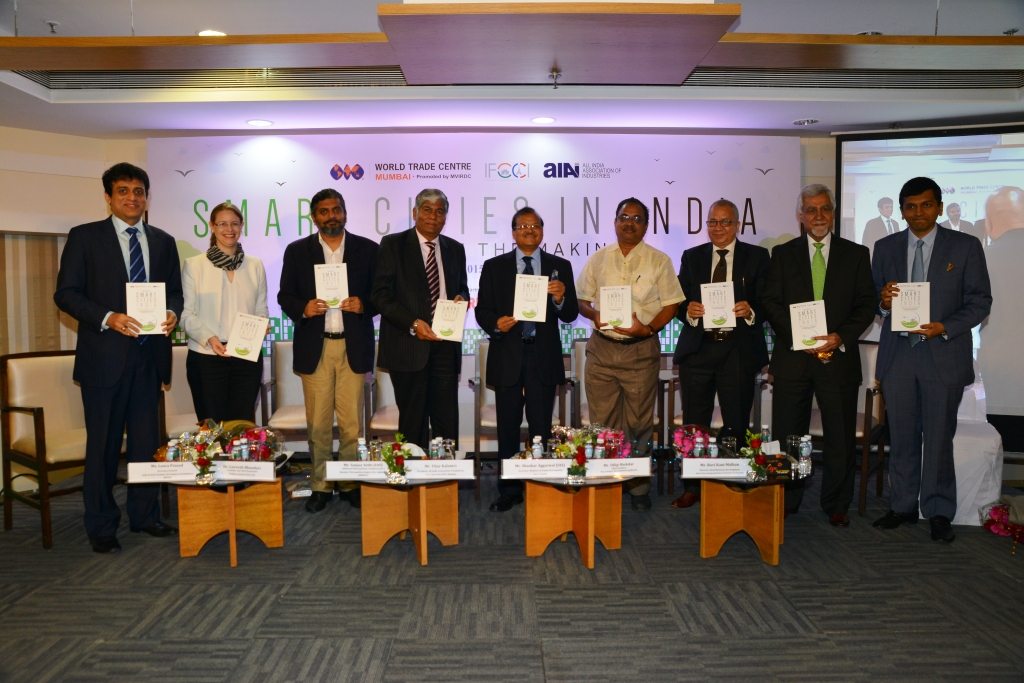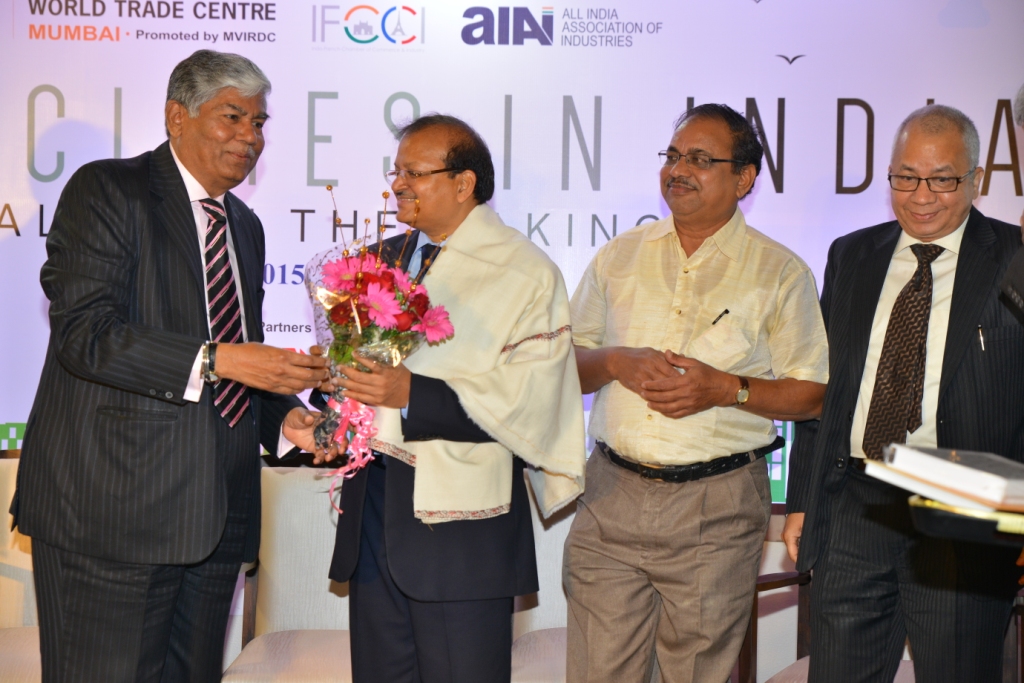- Home
- About
- Team
- About the President
- Mission
- Advisory bodies
- Associates
- Privacy Policy
- Terms and Conditions
- Cancellation, Returns & Refund Policy
- Pricing Policy
- Services
- Activities
- Events
- International Desk
- Sectors
- MSME
- Membership
- Publication
- Media
- Contact
Sustainable Smart Cities is the Way Ahead for inclusive Economic Growth
“The exciting times that we are living in are transformational in nature for India. We can all perform wonderfully well under the present government which is focused in its goals to provide meaningful and inclusive growth. This can be achieved when the 22 percent of the population that is below the poverty line, the 50 percent below the empowerment line and the disadvantaged are included in such growth. This has brought us to the juncture to relook at the urbanization process, since growth and in turn employment is generated from the urban sector”, said Shri Shankar Aggarwal (IAS) Secretary, Ministry of urban Development, Government of India, who delivered the keynote address at interactive panel discussion on ‘Smart Cities in India: Reality in the Making’ jointly organized by MVIRDC World Trade Centre and All India Association of Industries along with the Indo-French Chamber of Commerce & Industry.
While addressing how 100 Smart Cities initiative came about, Shri Aggarwal said that the process started with the Swachh Bharat Abhiyan, to rejuvenating heritage towns, bringing about urban renewal of 500 towns leading to creation of the 100 smart cities. He highlighted that Indians were basically entrepreneurial by nature. India possessed demographic dividend and the urban population of 31 per cent contributes to 63 per cent of GDP. It is education that would bring about empowerment; however the quality of education is poor which can be fixed through the right infrastructure such as e-education, imparting good quality skills. Each step of the process can be made sustainable and frugal innovation can be introduced in every area which then can be supported by governments and semi-government bodies.
Shri Aggarwal advocated that national priorities could be made a reality through technology, innovation, citizen involvement, employment generation through ‘Make in India’ while improving the quality of life. In order to bring about the smart cities concept, it is important to introduce competition among cities through the Bloomberg Philanthropy whereby funding solution to urban challenges could be reached. Assuring to set up 100 cities in a span of 10 years, Shri Aggarwal was supportive towards adding to the existing strength of the people, providing the necessary hand holding in seeing projects through and being a facilitator in the entire process.
Dr. Laveesh Bhandari, Founder and Chief Economist, Indicus Analytics Pvt Ltd. the moderator of the panel discussion while introducing the panelists showed skepticism in the policy making and sustainability issues in creating smart cities.
Mr. Sanjay Sethi (IAS). Additional Metropolitan Commissioner-I, Mumbai Metropolitan Region Development Authority (MMRDA) while attempting to define the smart city concept said that the right definition would emphasize the process of creating a smart city and not the final product. Providing a case study on the Bandra-Kurla Complex (BKC) in making it a Brownfield Smart City Project, he said that they were achieving it through the use of ICT and non ICT initiatives coupled with the right urban design. Besides, the formation is based on foundational, advanced and futuristic initiative which is the way forward. Smart BKC was being built around centricity, business and making it environment friendly through the process of continuous innovation. It was being conceptualized in comparison to global cities. In a similar way, Smart Wadala Greenfield project was being conceptualized to include mixed land use, smart transport, pedestrian segregation, green buildings, intelligent buildings and smart physical infrastructure.
Mr. Abhishek Lodha, Managing Director, Lodha Group brought in the aspect of the private sector in the creation of smart cities. He opined that some of the most livable cities across that world have incorporated the various smart elements to improve the quality of life for its citizens. Smart Cities need to become smarter in multiple domains across governance, sustainability while improving overall quality of life of its citizens he added. Citing the example of Palava, a project involving an initial investment of Rs. 30,000 crore, he said that the project was exemplifying the smart city opportunity with numerous initiatives being rolled out.
Earlier in the welcome address, Mr. Vijay Kalantri, Vice Chairman, MVIRDC World Trade Centre and President, All India Association of Industries, while stressing on the need for infrastructure in order to create smart cities he said that the Honorable Prime Minister Shri Narendra Modi announced the 100 Smart initiative which has opened up a plethora of opportunities as well as challenges necessitating some innovative approaches and measures. Although a vision to make Smart Cities was in place, he stressed the need to frame policies for the implementation process while also making the people involved accountable.
On the occasion, a Handbook on Smart Cities India – Reality in the Making was released at the hands of the dignitaries present on the dais.
Mr. Sanjay Sethi (IAS), Additional Metropolitan Commissioner-I,Mumbai Metropolitan Region Development Authority (MMRDA), Ms. Laura Prasad, Secretary General, Indo French Chamber of Commerce & Industry (IFCCI), Dr. Laveesh Bhandari, Founder and Chief Economist, Indicus Analytics Pvt. Ltd., Mr. Vijay Kalantri, President, All India Association of Industries and Vice Chairman, MVIRDC World Trade Centre, Mr. Shankar Aggarwal, IAS, Secretary, Ministry of Urban Development Government of India, Mr. Dilip Shekdar, Chief Architect, Naya Raipur Development Authority, Mr. Ravi Kant Malhan, Director, Head Business Development: Smart Cities and Special Projects, Schneider Electric India, Capt. Somesh Batra, Vice Chairman, MVIRDC World Trade Centre and Mr. Abhishek Lodha, Managing Director, Lodha Group releasing a Handbook on ‘Smart Cities India: Reality in the Making’ during the the interactive panel discussion on ‘Smart Cities in India: Reality in the Making’ jointly organized by All India Association of Industries and World Trade Centre along with the Indo-French Chamber of Commerce & Industry
 Mr. Vijay Kalantri, President, All India Association of Industries and Vice Chairman, MVIRDC World Trade Centre and felicitating Mr. Shankar Aggarwal, IAS, Secretary, Ministry of Urban Development Government of India, looking on are Mr. Dilip Shekdar, Chief Architect, Naya Raipur Development Authority, Mr. Ravi Kant Malhan, Director, Head Business Development: Smart Cities and Special Projects, Schneider Electric India at the interactive panel discussion on ‘Smart Cities in India: Reality in the Making’ jointly organized by All India Association of Industries and World Trade Centre along with the Indo-French Chamber of Commerce & Industry
Mr. Vijay Kalantri, President, All India Association of Industries and Vice Chairman, MVIRDC World Trade Centre and felicitating Mr. Shankar Aggarwal, IAS, Secretary, Ministry of Urban Development Government of India, looking on are Mr. Dilip Shekdar, Chief Architect, Naya Raipur Development Authority, Mr. Ravi Kant Malhan, Director, Head Business Development: Smart Cities and Special Projects, Schneider Electric India at the interactive panel discussion on ‘Smart Cities in India: Reality in the Making’ jointly organized by All India Association of Industries and World Trade Centre along with the Indo-French Chamber of Commerce & Industry
Recent Posts
- Press Release : All India Association of Industries and World Trade Center Mumbai and TERI Advance Dialogue on India’s Low-Carbon Transition 17th Feb 2026
- All India Association of Industries and World Trade Center Mumbai Welcomes Historic India–EU Trade Agreement; Calls It a Defining Moment for Global Economic Partnership 17th Feb 2026
- 77th Republic Day Celebrations at WTC Mumbai: Honoring Viksit Bharat and Ecoconomic Triumphs 17th Feb 2026
Categories
- Agriculture
- Banking and finance
- Biotechnology
- Business Process Outsourcing
- Chemicals
- Defence
- Drugs & Pharmaceuticals
- Economic Affairs & Taxation
- Energy
- Engineering
- Exports & Imports
- Food Processing
- Food Processing
- ICTE Manufacturing
- Inbound delegation
- Information & Communication Technology
- Infrastructure
- Innovation
- Logistics
- Manufacturing
- Media & Entertainment
- Medium & Small Scale Industry
- Micro
- Oil and Gas
- Petrochemicals
- Ports
- Power
- Press Information Bureau-Government of India
- Press Release
- Press Release: Quanzhou Delegation Explores Business Collaboration in India
- Renewable Energy
- Tourism & Hospitality
- Uncategorized
- Women Empowerment
Archives
- February 2026
- December 2025
- October 2025
- July 2025
- June 2025
- April 2025
- March 2025
- January 2025
- December 2024
- June 2024
- May 2024
- April 2024
- March 2024
- January 2024
- November 2023
- October 2023
- September 2023
- August 2023
- July 2023
- June 2023
- May 2023
- April 2023
- March 2023
- February 2023
- January 2023
- February 2022
- January 2022
- December 2021
- November 2021
- October 2021
- September 2021
- August 2021
- July 2021
- June 2021
- May 2021
- April 2021
- March 2021
- February 2021
- January 2021
- December 2020
- November 2020
- September 2020
- August 2020
- June 2020
- May 2020
- April 2020
- March 2020
- February 2020
- January 2020
- November 2019
- August 2019
- July 2019
- May 2019
- April 2019
- March 2019
- July 2018
- June 2018
- April 2018
- February 2018
- January 2018
- December 2017
- November 2017
- October 2017
- September 2017
- August 2017
- July 2017
- June 2017
- May 2017
- April 2017
- March 2017
- February 2017
- January 2017
- December 2016
- November 2016
- October 2016
- September 2016
- August 2016
- July 2016
- June 2016
- May 2016
- April 2016
- March 2016
- February 2016
- January 2016
- December 2015
- November 2015
- October 2015
- September 2015
- August 2015
- July 2015
- June 2015
- May 2015
- April 2015
- March 2015
- February 2015
- January 2015
- December 2014
- November 2014
- October 2014
- September 2014
- August 2014
- July 2014
- June 2014
- May 2014
- April 2014
- March 2014
- February 2014
- January 2014
